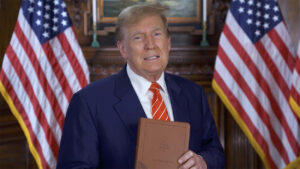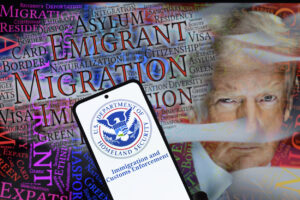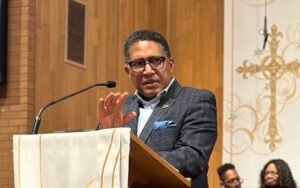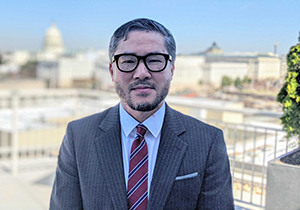Cuts at Department of Education decried, praised
Trump administration efforts to dismantle the U.S. Department of Education by slashing its workforce and closing offices is a “reckless move” that will create “chaos and confusion” and undermine religious freedom, said Amanda Tyler, executive director of the Baptist Joint Committee for Religious Liberty.

“Public education and religious liberty go hand in hand. Public schools are the only education system where students’ rights to religious freedom are guaranteed to be fully protected,” Tyler said.
“Weakening federal oversight eliminates protections for religious freedom for all students, students with disabilities and low-income families. It is a blatant move to privatize education, redirecting public funds toward private sectarian schools at the expense of public institutions that serve all children.”
While the president lacks authority to dissolve a government department created by Congress without congressional approval, the Trump administration has implemented a major reduction in force affecting nearly half of its employees.
The Dallas regional Department of Education office that handles civil rights complaints is among seven being closed.
“This action is not about improving education—it is about asserting more authority than the president has,” Tyler said. “Gutting the Department of Education creates continued chaos and confusion, particularly for the most vulnerable students.
“This reckless move directly threatens religious liberty by eliminating staff engaged in essential oversight that ensures students can freely practice—or choose not to practice—religion without government coercion. Without these protections, public schools will be vulnerable to state-sponsored religious mandates and discrimination.
“Millions of students across the country will only be harmed, not helped, by firing seasoned civil servants who work tirelessly to ensure they are able to access a quality education. Systematically shutting down the department strips students of federal protections, denies them essential services, and leaves states and districts to fend for themselves.”
Some assert department pushes ‘political ideology’
Of course, not everyone agreed with Tyler. The conservative Eagle Forum applauded what it called an end to “the reign of the Department of Un-Education.”
“Since its opening in 1979, radical teachers unions, and leftist politicians have used this agency to push their political ideology into America’s classrooms and overstep states’ rights. Young minds have been poisoned, parents’ rights have been eroded and test scores have failed to improve. … President Donald Trump has been fulfilling his promises to make American education great again in recent weeks,” the Eagle Forum stated on its website.
Last November, evangelist Franklin Graham voiced support for Trump’s call to shut down the Department of Education.
“The Department of Education has only existed since 1979, and we were better off without it,” Graham posted on Facebook. “We have been spending billions of dollars for what?
“To dumb our children down? To teach them to disrespect the flag and our nation? To introduce them to sexual content at earlier ages including gay and transgender agendas? For them to be taught the lies of Critical Race Theory and DEI? … I think we can do better. Put the parents back in the driver’s seat and let schools come under state and local leadership.”
Part of a larger effort to destroy public education
Rachel Laser, president and CEO of Americans United for Separation of Church and State, linked the Trump Administration’s efforts to dismantle the Department of Education to “the Christian nationalist agenda set out in Project 2025 to destroy public education that benefits all communities in favor of private, religious education.”
Public school districts and universities around the country—and the students they serve—depend on the Department of Education, Laser said.
“Among its many important functions, the Department of Education ensures that millions of American students receive financial aid for higher education and that public schools respect students’ civil rights,” Laser said.
“The stroke of a magic marker cannot take away those important functions and rights from American students.”
Laser alluded to a widely circulated draft of an executive order directing Secretary of Education Linda McMahon to facilitate the closing of the Department of Education “to the maximum extent appropriate and permitted by law.” To date, the president has not signed an executive order concerning the Department of Education.

Charles Foster Johnson, founding executive director of Pastors for Texas Children, emphasized the important work of the U.S. Department of Education.
“While public education is mainly a state authority and not a federal one, the Department of Education does put the weight of the U.S. Constitution behind the goal of ensuring that minority children of color and disability receive the same educational opportunity as the majority.”
Johnson linked the efforts to cut the Department of Education to efforts at the state and local level to undermine public education and redirect public funds to private schools.
“The same people behind dismantling the federal Department of Education are also pushing private school voucher programs in all the states. These political forces have opposed publicly funded universal education for decades,” Johnson said.
“The end goal of the voucher crowd is to end American public education, to destroy our children’s publicly provided education accorded to all children, and to put it on an open, privatized market—simply put, to make commodities of our kids and for-profit markets of our classrooms. It’s wrong and must be stopped.”






 The bill would bar immigration enforcement actions at or near churches and an array of other locations—such as organizations that assist children or pregnant women, rape crisis centers, sites of funerals, weddings or other “public religious ceremonies,” Social Security offices and polling places—except “under exigent circumstances.”
The bill would bar immigration enforcement actions at or near churches and an array of other locations—such as organizations that assist children or pregnant women, rape crisis centers, sites of funerals, weddings or other “public religious ceremonies,” Social Security offices and polling places—except “under exigent circumstances.”





